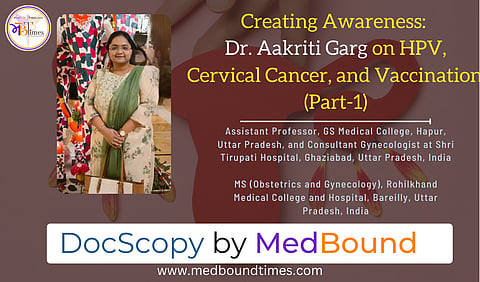Creating Awareness: Dr. Aakriti Garg on HPV, Cervical Cancer, and Vaccination (Part-1)
Dr. Aakriti Garg is an MBBS, MS OB-GYN (Obstetrics and Gynecology), a Laparoscopic Surgeon, and an Aesthetic and Cosmetic Gynecologist. She did her MBBS from Netaji Subhash Chandrabose Subharti Medical College, Meerut from 2012 to 2017. She did her MS OB-GYN from Rohilkhand Medical College, Bareilly from 2020 to 2023. Then she did a senior residency of one year from 2023-2024. Currently, she is an Assistant Professor at GS Medical College, Hapur and she is doing private practice at Shri Tirupati Hospital, Kavi Nagar, Ghaziabad, U.P. She has a total work experience of 5 years.
In this interview with Dr. Anam Khan of MedBound Times, Dr. Aakriti shares her insights on the early detection and prevention of Cervical Cancer and the importance of the HPV (Human papillomavirus infection) Vaccination.
Dr. Anam Khan: Could you please tell our readers a little bit about yourself?
Dr. Aakriti Garg: Hello! I'm Dr. Aakriti Garg, a Laparoscopic Surgeon, and an Aesthetic and Cosmetic Gynecologist. I completed my MBBS from Netaji Subhash Chandrabose Subharti Medical College, Meerut, from 2012 to 2017. I then pursued my MS OBGYN from Rohilkhand Medical College, Bareilly, from 2020 to 2023. Following that, I completed a one-year senior residency from 2023 to 2024. Currently, I am an Assistant Professor at GS Medical College, Hapur, and maintain a private practice at Shri Tirupati Hospital, Kavi Nagar, Ghaziabad, Uttar Pradesh, India.
Dr. Anam Khan: What is HPV, and how does it contribute to the development of cervical cancer?
Dr. Aakriti Garg: HPV is a small, non-enveloped entity with a diameter of 52-55 nm. It comprises a single double-stranded DNA molecule of about 8,000 base pairs, which is encapsulated within a protein capsid made up of 72 pentameric capsomeres. The structure of HPV enables it to effectively infect epithelial cells, leading to a range of outcomes from benign warts to malignant cancers, including cervical, anal, and oropharyngeal cancers.
Dr. Anam Khan: Are all HPV infections dangerous, or do some resolve on their own without causing harm?
Dr. Aakriti Garg: HPV has been broadly classified into low-risk and high-risk types based on its oncogenic potential. The HPV genome has three different functional regions of which E6 and E7 oncoproteins play a central role in the development of cancer by interfering with the host's tumor suppressor proteins.
Dr. Anam Khan: What are the early signs and symptoms of cervical cancer that women should be aware of?
Dr. Aakriti Garg: Cervical cancer often develops slowly and may not cause any symptoms in its early stages. However, as the disease progresses, the following symptoms may appear:
Abnormal bleeding patterns: This includes bleeding between periods, after sexual intercourse, or post-menopause.
Unusual vaginal discharge: A watery, pink, or foul-smelling discharge may be a sign of cervical cancer.
Pelvic Pain: Persistent pain in the pelvis or lower back.
Pain During Intercourse: Discomfort or pain during sexual intercourse can be a symptom.
Increased Urination: Frequent or urgent urination, sometimes accompanied by pain.
Dr. Anam Khan: How effective is the HPV vaccine in preventing cervical cancer? At what age should individuals get vaccinated?
Dr. Aakriti Garg: One should get vaccinated as early as 9 years of age or preferably in the age group of 9-14 years.
Dr. Anam Khan: Can women above the recommended vaccination age still benefit from the HPV vaccine?
Dr. Aakriti Garg: Yes, women can get themselves vaccinated up until 45 years of age. The effectiveness of the vaccine may vary (it might be slightly less) as the females might have been exposed to the virus already.
Dr. Anam Khan: Are there any misconceptions or myths about the HPV vaccine that you would like to address?
Dr. Aakriti Garg: The association of HPV with sexual activity often results in the vaccine being perceived as an endorsement of early sexual activity. This perception leads to reluctance in discussing the vaccine openly. Adolescents usually fear getting injections. Some people think of it as a method of sterilization. Some link HPV to HIV and other sexually transmitted infections. Convincing them to vaccinate is tough as nobody wants to openly discuss it.
Dr. Anam Khan: What are the risk factors that increase the likelihood of developing cervical cancer?
Dr. Aakriti Garg: Early age of sexual activity, multiple sexual partners, smoking and tobacco, chronic cervicitis, partners with a history of HPV infections, family history of cervical cancer or HPV-related cancers, receptive anal sex.
Stay tuned for Part 2 of the interview for more insights by Dr. Aakriti on Cervical Cancer and its vaccination.


